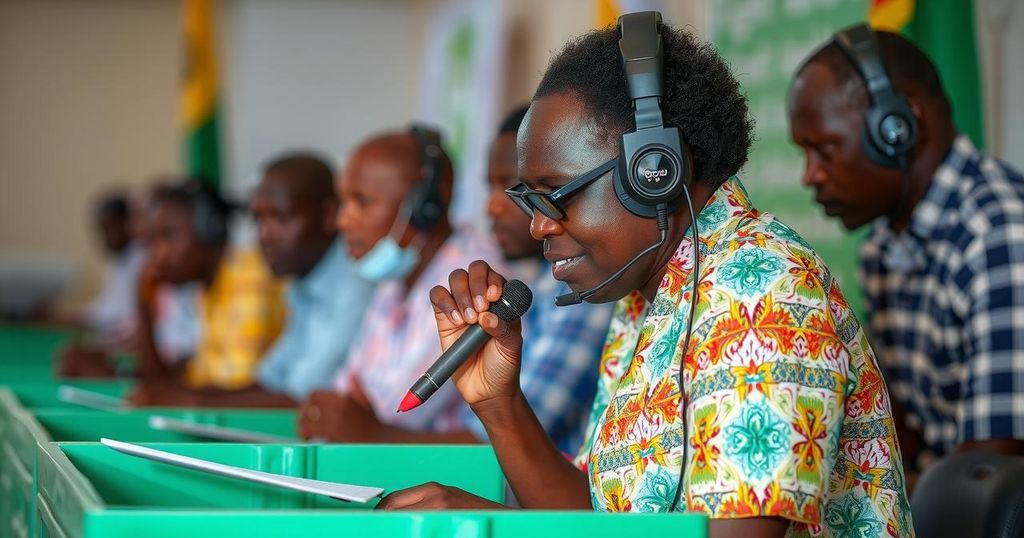Ghana will hold elections on December 7, 2024, with the potential for significant impacts on the democratic landscape. Key issues include economic instability, concerns about electoral integrity, and the threat of political violence, particularly amid a concerning backdrop of corruption and historical tensions. Major candidates Mahamudu Bawumia and John Mahama will vie for leadership, making this election a pivotal moment for the country’s democratic resilience.
On December 7, Ghana will hold significant elections where citizens will select a new president and members of Parliament across 275 constituencies. Voters will have the opportunity to choose from twelve presidential candidates, although realistically, the contest is expected to be between the National Democratic Congress (NDC) and the governing New Patriotic Party (NPP). This election is crucial as the incumbent, President Nana Akufo-Addo, cannot seek re-election due to term limits.
The current electoral climate is influenced by pressing economic challenges and evolving political dynamics. The Ghanaian populace is primarily concerned about economic stability and the rising cost of living, particularly as the Ghanaian cedi has depreciated significantly against the US dollar since 2018. Furthermore, issues surrounding electoral transparency, with the NDC questioning the integrity of the Electoral Commission, have delayed crucial agreements that would ensure a peaceful electoral process. Corruption, vote buying, and financial mismanagement remain substantial issues highlighted by a report from the International Republican Institute (IRI), underscoring concerns about the looting of state assets and continuous political misconduct.
In anticipation of the upcoming election, voter engagement is expected to remain robust. The previous election in 2020 recorded a voter turnout of 78.89 percent, and similar levels of participation are anticipated for 2024. However, the risk of electoral violence presents a critical threat to the stability of Ghana’s democratic framework. This stems from the majoritarian electoral system, which inherently fosters a ‘winner takes all’ perspective. This dynamic can lead parties to resort to unethical practices, including the use of hate speech and violent intimidation, as experienced during the previous electoral cycle, which regrettably resulted in fatalities.
The key candidates in this election, Mahamudu Bawumia (NPP) and John Mahama (NDC), both possess substantial political experience. Bawumia served as Vice President under Akufo-Addo and has had a prominent role at the Bank of Ghana, while Mahama previously held the presidency from 2012 to 2017 and aims for a comeback after a loss in the 2016 elections. The stakes for the NPP are particularly high, as they strive to maintain their electoral dominance, marked by victories in 2016 and 2020, emphasizing the narrative of “breaking the eight.”
The upcoming election represents a pivotal moment for Ghana’s democratic integrity, with implications that resonate throughout West Africa. Historically viewed as a model of democracy, Ghana’s stability is crucial not only for its citizens but also for the broader regional landscape. It is imperative to support the establishment of a transparent and peaceful electoral process to combat the encroachment of democratic deterioration in a region grappling with increasing instability.
Ghana is approaching a critical election period, which will see its citizens vote for a new president and parliamentary representatives on December 7. The political landscape has been dominated by the NDC and NPP since the re-establishment of multiparty politics in the early 1990s. The economic challenges faced by the nation, alongside political dynamics, significantly shape the electoral environment. As these elections draw near, the country is grappling with persistent issues that could impact the democratic process, including concerns about corruption, violence, and electoral fairness.
In conclusion, the upcoming Ghanaian elections are critical not just for shaping the future of the country, but also for the stability of the West African region. The economic concerns and political challenges must be addressed to uphold the democratic values that Ghana has historically exemplified. The involvement of voters in a transparent and peaceful electoral process will be essential to ensuring that Ghana continues to serve as a beacon of democracy in West Africa.
Original Source: www.iri.org






